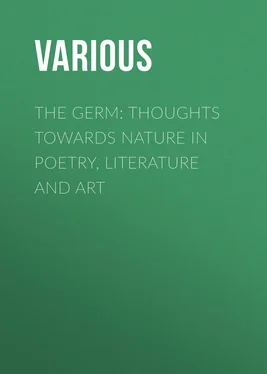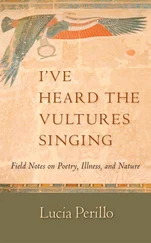Various - The Germ - Thoughts towards Nature in Poetry, Literature and Art
Здесь есть возможность читать онлайн «Various - The Germ - Thoughts towards Nature in Poetry, Literature and Art» — ознакомительный отрывок электронной книги совершенно бесплатно, а после прочтения отрывка купить полную версию. В некоторых случаях можно слушать аудио, скачать через торрент в формате fb2 и присутствует краткое содержание. Жанр: foreign_prose, foreign_antique, на английском языке. Описание произведения, (предисловие) а так же отзывы посетителей доступны на портале библиотеки ЛибКат.
- Название:The Germ: Thoughts towards Nature in Poetry, Literature and Art
- Автор:
- Жанр:
- Год:неизвестен
- ISBN:нет данных
- Рейтинг книги:3 / 5. Голосов: 1
-
Избранное:Добавить в избранное
- Отзывы:
-
Ваша оценка:
- 60
- 1
- 2
- 3
- 4
- 5
The Germ: Thoughts towards Nature in Poetry, Literature and Art: краткое содержание, описание и аннотация
Предлагаем к чтению аннотацию, описание, краткое содержание или предисловие (зависит от того, что написал сам автор книги «The Germ: Thoughts towards Nature in Poetry, Literature and Art»). Если вы не нашли необходимую информацию о книге — напишите в комментариях, мы постараемся отыскать её.
The Germ: Thoughts towards Nature in Poetry, Literature and Art — читать онлайн ознакомительный отрывок
Ниже представлен текст книги, разбитый по страницам. Система сохранения места последней прочитанной страницы, позволяет с удобством читать онлайн бесплатно книгу «The Germ: Thoughts towards Nature in Poetry, Literature and Art», без необходимости каждый раз заново искать на чём Вы остановились. Поставьте закладку, и сможете в любой момент перейти на страницу, на которой закончили чтение.
Интервал:
Закладка:
“… There are so many original and beautiful thoughts in these pages—indeed some of the poems & tales are in themselves so beautiful in spirit & form—that we have hopes of the writers, when they shall have got rid of those ghosts of mediæval art which now haunt their every page. The essay ‘On the Mechanism of a Historical Picture’ is a good practical treatise, and indicates the hand of writing which is much wanted among artists”
Morning Chronicle.“We depart from our usual plan of noticing the periodicals under one heading, for the purpose of introducing to our readers a new aspirant for public favour, which has pecu liar and uncommon claims to attention, for in design & execution it differs from all other periodicals … A periodical largely occupied with poetry wears an unpromising aspect to readers who have learned from experience what nonsensical stuff most fugitive Magazine poetry is.... But, when they have read a few extracts which we propose to make, we think they will own that for once appearances are deceitful.... That the contents of this work are the productions of no common minds, the following extracts will sufficiently prove.... We have not space to take any specimens of the prose; but the essays on Art are conceived with an equal appreciation of its meaning& requirements. Being such, this work has our heartiest wishes for its success, but we scarcely dare to hopethat it may win the popularity it deserves. The truth is that it is too good for the time. It is not materialenough for the age”
Critic.“… It bears unquestionable evidences of true inspirations and, in fact, is so thoroughly spiritual that it is more likely to find ‘the fit audience though few’ than to attract the multitude … The prose articles are much to our taste … We know, however, of no periodical of the time which is so genuinely poetical and artistic in its tone.”
Standard of Freedom.The Germ: Thoughts towards Nature In Poetry, Literature, and Art.
No. 1. January, 1850
When whoso merely hath a little thought
Will plainly think the thought which is in him,—
Not imaging another's bright or dim,
Not mangling with new words what others taught;
When whoso speaks, from having either sought
Or only found,—will speak, not just to skim
A shallow surface with words made and trim,
But in that very speech the matter brought:
Be not too keen to cry—“So this is all!—
A thing I might myself have thought as well,
But would not say it, for it was not worth!”
Ask: “Is this truth?” For is it still to tell
That, be the theme a point or the whole earth,
Truth is a circle, perfect, great or small?
My Beautiful Lady
I love my lady; she is very fair;
Her brow is white, and bound by simple hair;
Her spirit sits aloof, and high,
Altho' it looks thro' her soft eye
Sweetly and tenderly.
As a young forest, when the wind drives thro',
My life is stirred when she breaks on my view.
Altho' her beauty has such power,
Her soul is like the simple flower
Trembling beneath a shower.
As bliss of saints, when dreaming of large wings,
The bloom around her fancied presence flings,
I feast and wile her absence, by
Pressing her choice hand passionately—
Imagining her sigh.
My lady's voice, altho' so very mild,
Maketh me feel as strong wine would a child;
My lady's touch, however slight,
Moves all my senses with its might,
Like to a sudden fright.
A hawk poised high in air, whose nerved wing-tips
Tremble with might suppressed, before he dips,—
In vigilance, not more intense
Than I; when her word's gentle sense
Makes full-eyed my suspense.
Her mention of a thing—august or poor,
Makes it seem nobler than it was before:
As where the sun strikes, life will gush,
And what is pale receive a flush,
Rich hues—a richer blush.
My lady's name, if I hear strangers use,—
Not meaning her—seems like a lax misuse.
I love none by my lady's name;
Rose, Maud, or Grace, are all the same,
So blank, so very tame.
My lady walks as I have seen a swan
Swim thro' the water just where the sun shone.
There ends of willow branches ride,
Quivering with the current's glide,
By the deep river-side.
Whene'er she moves there are fresh beauties stirred;
As the sunned bosom of a humming-bird
At each pant shows some fiery hue,
Burns gold, intensest green or blue:
The same, yet ever new.
What time she walketh under flowering May,
I am quite sure the scented blossoms say,
“O lady with the sunlit hair!
“Stay, and drink our odorous air—
“The incense that we bear:
“Your beauty, lady, we would ever shade;
“Being near you, our sweetness might not fade.”
If trees could be broken-hearted,
I am sure that the green sap smarted,
When my lady parted.
This is why I thought weeds were beautiful;—
Because one day I saw my lady pull
Some weeds up near a little brook,
Which home most carefully she took,
Then shut them in a book.
A deer when startled by the stealthy ounce,—
A bird escaping from the falcon's trounce,
Feels his heart swell as mine, when she
Stands statelier, expecting me,
Than tall white lilies be.
The first white flutter of her robe to trace,
Where binds and perfumed jasmine interlace,
Expands my gaze triumphantly:
Even such his gaze, who sees on high
His flag, for victory.
We wander forth unconsciously, because
The azure beauty of the evening draws:
When sober hues pervade the ground,
And life in one vast hush seems drowned,
Air stirs so little sound.
We thread a copse where frequent bramble spray
With loose obtrusion from the side roots stray,
(Forcing sweet pauses on our walk):
I'll lift one with my foot, and talk
About its leaves and stalk.
Or may be that the prickles of some stem
Will hold a prisoner her long garment's hem;
To disentangle it I kneel,
Oft wounding more than I can heal;
It makes her laugh, my zeal.
Then on before a thin-legged robin hops,
Or leaping on a twig, he pertly stops,
Speaking a few clear notes, till nigh
We draw, when quickly he will fly
Into a bush close by.
A flock of goldfinches may stop their flight,
And wheeling round a birchen tree alight
Deep in its glittering leaves, until
They see us, when their swift rise will
Startle a sudden thrill.
I recollect my lady in a wood,
Keeping her breath and peering—(firm she stood
Her slim shape balanced on tiptoe—)
Into a nest which lay below,
Leaves shadowing her brow.
I recollect my lady asking me,
What that sharp tapping in the wood might be?
I told her blackbirds made it, which,
For slimy morsels they count rich,
Cracked the snail's curling niche:
She made no answer. When we reached the stone
Where the shell fragments on the grass were strewn,
Close to the margin of a rill;
“The air,” she said, “seems damp and chill,
“We'll go home if you will.”
Интервал:
Закладка:
Похожие книги на «The Germ: Thoughts towards Nature in Poetry, Literature and Art»
Представляем Вашему вниманию похожие книги на «The Germ: Thoughts towards Nature in Poetry, Literature and Art» списком для выбора. Мы отобрали схожую по названию и смыслу литературу в надежде предоставить читателям больше вариантов отыскать новые, интересные, ещё непрочитанные произведения.
Обсуждение, отзывы о книге «The Germ: Thoughts towards Nature in Poetry, Literature and Art» и просто собственные мнения читателей. Оставьте ваши комментарии, напишите, что Вы думаете о произведении, его смысле или главных героях. Укажите что конкретно понравилось, а что нет, и почему Вы так считаете.












